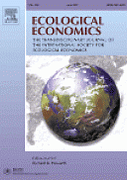The economic value of Canada’s National Capital Green Network
19 janvier 2021








Lévesque A., Kermagoret C., Poder T.G., L'Ecuyer-Sauvageau C., He J., Sauvé S., Dupras J. (2021) Financing on-farm ecosystem services in southern Quebec, Canada: A public call for pesticides reduction, Ecological Economics, 184(2) p. 106997.